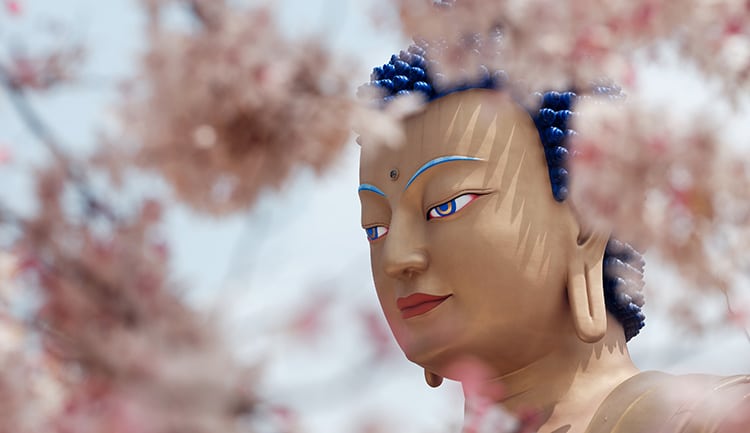The Challenges of Silent Meditation
Category: Benefits of Meditation | Types of Meditation

For centuries, silent meditation was reserved for the privileged few who had renounced the world and sought communion – with the divine, the universe, or their own inner being – in remote cloisters and retreat settings around the world. Nowadays though, intensive silent meditation practices have become widely available through a variety of organizations, both religious and secular. A popular mindfulness/awareness version of this is called a Vipassana (“seeing things just as they are”) retreat.
Have you ever wanted to participate in a silent meditation retreat? The guided Vipassana retreat usually entails practicing silent meditation in a remote meditation center for up to 10 days at a stretch. Imagine spending 10 entire days away from the familiarity of interpersonal conversations and internet connectivity! During those days, you are expected to avoid eye contact with other people and you shouldn’t speak to one another. Sure it’s a bit tough, especially for beginners, but it’s one of those experiences that are simply life-changing.
5 challenges and benefits of silent meditation
- Patience
If you tend to feel like you should be working on something else instead of meditating, relax, you’re in good company. Many people find it hard to sit through an entire silent meditation retreat because of the persistent feeling that they should be doing other “important stuff.”
To counteract this challenge, it’s important to acknowledge the presence of this lack of patience when it arises. This empowers you to deal with the feeling effectively instead of letting it rule you. Acknowledging and letting go are the sine qua non for effective meditation. By recognizing and working with feelings of impatience, you prepare your mind to effectively face all kinds of other issues with aplomb. This builds confidence in the process and in your ability to put the method into practice.
- Diligence
As you continue meditating, you’ll reach a point where your mind will finally settle into a calm place of well-being and balance. This could happen during your silent meditation retreat or while practicing at home alone. When you reach this level, you might decide to cut your meditation sessions short, thinking that you’ve effectively achieved what you set out to do. In truth, though, dismissing your sessions early would cause you to miss out on the vast benefits of consistent meditation.
It’s important to continue meditating when you feel that initial calmness. Learn to deepen your calm and enhance your clarity as well. You’ll find that the calm state of mind comes and goes; just like any other experience, it is impermanent. Perseverance will teach you how to appreciate the moments of calmness as well as the moments of mental activity.
- Making meditation an integral part of your day
When it’s time to meditate, it often seems that there are dozens of tasks that require your attention. How often have you had the intention to practice on a regular basis, only to attend to “more pressing” issues instead? It may even be hard to carve out time for that silent meditation retreat that you’ve been planning for months.
The key to beating this challenge is to change your whole perception of meditation. Start by viewing this practice as an integral part of your daily routine, just like taking a shower or having a meal. Tune your mind into integrating meditation into your daily regimen. Most meditators find that a regular practice actually gives them more time to accomplish their daily routines because they develop the mental space to be more direct, focused and efficient for the rest of the day.
- Sleep
It’s usually only during intensive meditation retreats that your practice may take time away from your sleep. When you’re sitting at home or in a group outside of retreat, chances are that your practice will make it easier for you to unwind in the evening. If you find it difficult to fall asleep, guided relaxation meditations can be a great help.
- Contentedness
Feeling good after your daily meditation session can be inspiring, but it can also be a big obstacle if you expect to always have the same experience. It’s great to feel good, but don’t let this overshadow your bigger resolve to persist with daily silent meditation, come what may. There will be days when your meditation is blissful, and days when you’d like to throw your practice out the window.
Here again, the key is to observe these feelings without judgment or attachment, and forge on! Contentedness comes from the knowledge that you’re doing what it takes to get the most benefit from your practice: you’re staying the course. Jolly good!






